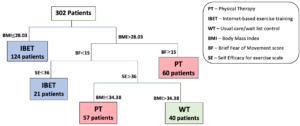Precision medicine for knee osteoarthritis
By Siyeon Kim

The precision medicine approach has been actively applied to arthritis studies. Firstly, a precision medicine approach has been applied to determine the optimal treatment regime for patients from the Intensive Diet and Exercise for Arthritis trial. After applying 24 machine learning models to different outcomes, the optimal model was chosen based on the improvements in each outcome, assuming that the patients had followed the estimated optimal rules. It was discovered that the combination of exercise and dietary weight loss was optimal for most participants.
Next, we have focused on obtaining dynamic treatment regimes for patients with osteoarthritis in the Physical Therapy vs. Internet-Based Exercise Training for Knee OA trial. Specifically, we developed a new tree-based method, Random Forest informed Tree-based Learning to identify underlying patient characteristics that impacted different improvements in the outcome while incorporating the advantages of random forest. The method determines interpretable treatment rules by sequentially splitting the patients into multiple disjoint subgroups and assign one of physical therapy, Internet-based exercise treating, or waitlist control. The finalized treatment rules are described in the figure above.
For more information, see:
Jiang, X., Nelson, A.E., Cleveland, R.J., Beavers, D.P., Schwartz, T.A., Arbeeva, L., Alvarez, C., Callahan, L.F., Messier, S., Loeser, R. and Kosorok, M. (2021), Precision Medicine Approach to Develop and Internally Validate Optimal Exercise and Weight-Loss Treatments for Overweight and Obese Adults With Knee Osteoarthritis: Data From a Single-Center Randomized Trial. Arthritis Care Res, 73: 693-701. https://doi.org/10.1002/acr.24179
Lab Members Involved:

